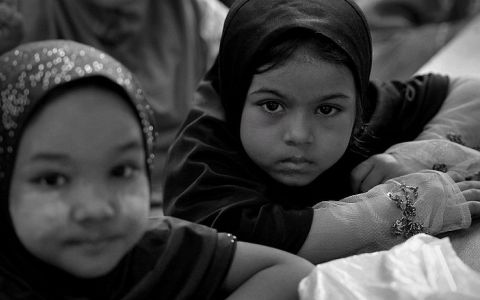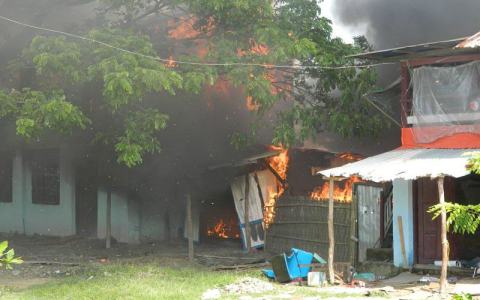ANALYSIS: Are Burmese Buddhists waging holy war?
by - 29th May 2015

RIOTS, rapes, killings, a large refugee population of ‘boat people’ – and most recently new laws which would allow individual states to regulate the pacing of births – the Rohingya Muslims of Burma have every right to feel under attack.
Things were not always this tense.
Burmese Buddhists and Muslims have lived side by side in peace for centuries.
The nineteenth-century reformer King Mindon built numerous mosques as well as Buddhist shrines, and even helped pay for a hostel in Mecca for visiting Muslim pilgrims making the Hajj.
Buddhist-Muslim antagonism gathered steam with the military coup of 1962.
‘The leaders portrayed themselves as devout, but showed no compassion in brutally repressing minorities and dissidents,’ as Aung Zaw wrote in a 2013 New York Times op-ed.
‘Today’s Buddhist extremists are the legacy of this policy.’
Aung San Suu Kyi
Aung San Suu Kyi is one of a handful of world leaders whose stature rises to the level of moral authority, alongside her fellow Buddhist and Nobel Laureate, HH the Dalai Lama.
She is also Burmese, and human.
Her father, Burmese independence leader Aung San, was assassinated in 1947 alongside a Muslim colleague, cabinet minister U Razak.
Her passions thus run deep.
Aung San Suu Kyi has also worked hard and suffered greatly in pursuit of political power to continue and complete the reforms her father began.
And that now puts her in a very difficult position.
Holy War?

‘Aung San Suu Kyi and her strategists are looking at the electoral maths’, declares Australia’s Myanmar scholar Nicholas Farrelly. He points to a growing majority antipathy towards Burma’s estimated 800,000 Rohingya Muslims.
Yet as years of anti-Rohingya riots led by Buddhist monks have taken their toll, Aung San Suu Kyi, herself a Theravada Buddhist, has remained conspicuously silent.
There are related tensions between Buddhists and Muslims in Sri Lanka.
As the late American Zen master John Daido Loori once observed, ‘Buddhism is not immune to the kind of distortions that have been used throughout human history by virtually all of the world's religions to justify so-called holy war’.
Dalai Lama
His Holiness the Dalai Lama has more than once appealed to Aung San Suu Kyi to speak out against Burmese Buddhists' hatred of the Rohingya.
He has also appealed to his fellow Buddhist monks.
Wirathu
The now celebrated monk Wirathu served almost a decade in jail for distributing pamphlets that incited rioting against the Rohingya.
He too feels passionately.
His proposition is almost disarmingly simple: ‘You can be full of kindness and love, but you cannot sleep next to a mad dog.’
As the many tragedies of the Rohingya boat-people -- and the refusal of several nearby states to take in the refugees -- caught the world’s attention these last few weeks, he was adamant:
‘These people should be taken in by Muslim countries — Indonesia, Malaysia and Brunei.’
A 2003 report in Asia Times noted one aspect of the problem:
‘While the idea of monks actually leading rioters may seem unusual, certain details make it less so. Myanmar's large and much feared military intelligence service, the Directorate of Defense Security Intelligence is commonly believed to have agents working within the monkhood.’
Response
An open letter titled World Buddhist Leaders’ Response to the Growing Ethnic Violence Against Muslims in Myanmar was published in 2012.
The Buddhist leaders’ proposal, too, was simple:
‘We wish to reaffirm to the world and to support you in practicing the most fundamental Buddhist principles of non-harming, mutual respect and compassion.
'These fundamental principles taught by the Buddha are at the core of Buddhist practice:
'Buddhist teaching is based on the precepts of refraining from killing and causing harm.
'Buddhist teaching is based on compassion and mutual care. Buddhist teaching offers respect to all, regardless of class, caste, race or creed.
'We are with you for courageously standing up for these Buddhist principles even when others would demonize or harm Muslims or other ethnic groups.
'It is only through mutual respect, harmony and tolerance that Myanmar can become a modern great nation benefiting all her people and a shining example to the world.’
While the Dalai Lama did not receive this letter in time to sign it, Ven. Thich Nhat Hanh, another well-known Buddhist monk who has been nominated for the Nobel Peace Prize, did so.
He was accompanied by other luminaries including Ven. Bhikkhu Bodhi, President of Buddhist Global Relief; Gandhi Peace Prize laureate Dr AT Ariyaratne; Ven. Hozan A Senauke; Dr Jack Kornfield; and Prof. Robert Thurman.
Global
As the Dalai Lama himself told The Australian in an interview only this week,
‘It's not sufficient to say: “How to help these people?” This is not sufficient. There's something wrong with humanity's way of thinking. Ultimately we are lacking concern for others' lives, others' wellbeing.’
That takes what must for him personally be a Buddhist concern, and puts it in global, humanitarian context.
